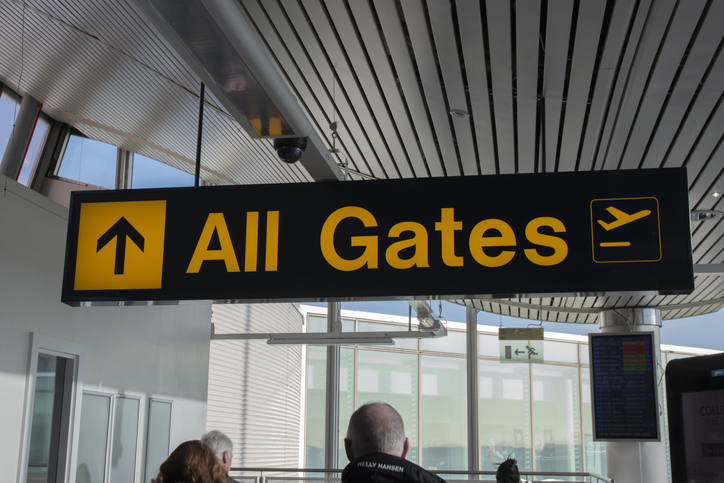
Since the UK left the EU, travel to Europe has been a little less straightforward than it used to be. Tighter rules have affected everything from longer queues at EU borders to extra costs and red tape for travelling with a pet.
But recent negotiations between the UK government and the EU have led to a relaxation of some Brexit travel restrictions. The rule changes, introduced in May 2025 – dubbed the ‘Brexit reset’ – mean things are now getting easier for UK holidaymakers.
We outline some of those changes and look at what the Brexit reset means for your next European getaway.
eGates coming for UK travellers at EU borders
Long queues at European borders have become a familiar sight for British travellers since Brexit. But that’s set to change. Under the new agreement, UK passport holders will soon be allowed to use eGates for faster entry into the EU.
eGates use biometric data and facial recognition to process your entry and exit at the border, removing the need to queue for a passport stamp from a border official.
Access to eGates will initially be limited to certain entry points where the technology is already in place. However, the UK government has confirmed plans to work with EU countries to expand availability in the future.
What does this mean for holidaymakers?
Using eGates should make passport checks much quicker. However, if you're travelling with children under 10, their passports will still need to be stamped by a border officer. Children aged 10 and over can use eGates, but must be accompanied by an adult.
Insurance tip: If you miss a flight due to long delays at passport control or other border checks, some comprehensive travel insurance policies include missed departure cover that could help you recover your costs. Always check your policy documents before you travel to understand what’s included.
Easier pet travel: the return of the pet passport
Pet lovers have something to celebrate. Under the new agreement, the UK is set to be reclassified as a ‘Part 1 listed country’ – meaning the return of the pet passport.
Since Brexit, pet owners have had to visit a vet and pay for an animal health certificate before every trip to the EU. For a UK family travelling with 2 dogs to an EU country, the cost can easily reach £200 – a steep addition to any holiday. The return of the pet passport means cheaper, more convenient travel – and importantly, less stress for you and your pet.
What’s changing?
With the UK’s new status, your pet will be able to travel freely between the UK and EU with a single pet passport. There’s no need for expensive vet trips to get an animal health certificate before each trip.
While rabies vaccinations will still be required, boosters won’t need to be administered in the EU. Instead, your UK vet can update your pet’s passport with the necessary vaccination details.
Travelling with a pet? Here’s what to know about cover
If you’re heading off with your pet, it’s worth knowing that most standard travel insurance policies won’t cover them – even if they’re travelling with you.
Some pet insurance providers offer optional travel cover to help fill this gap. Depending on the policy, this might include:
- veterinary fees abroad
- emergency repatriation for your pet
- trip cancellation cover if your pet becomes seriously ill before you go
If you’re looking for this kind of protection, some providers – like Petgevity – offer pet insurance with optional travel and holiday cover.
Erasmus and youth mobility: opportunities for younger travellers
While not everyone is packing a rucksack or heading off to study abroad, the Brexit reset brings good news for younger travellers.
The UK has agreed in principle to rejoin the Erasmus+ scheme, allowing UK students to study, train and work across the EU once again. There are also proposals for a ‘youth mobility scheme’ that would give people aged 18–30 the chance to live, work or travel in the EU for short periods, without a full visa.
What this means for holidaymakers: If you're a parent or grandparent helping to plan a gap year or extended trip, these changes could broaden options for your children or grandchildren.
Insurance tip: Look for long-stay or backpacker travel insurance that includes cover for work or study – and always make sure medical costs are included.

What about visas and migration?
While no major visa rules have changed just yet, the new Brexit reset includes closer cooperation on migration and border management. For now, UK travellers can still visit most EU countries visa-free for up to 90 days in any 180-day period.
When entering the EU, you may still be asked to show:
- return or onward travel tickets
- accommodation booking
- your travel insurance details
- proof of funds – under the standard rules of the Schengen Borders Code, you may be asked to show you have enough money to support yourself during your trip. This is rarely requested for most holidaymakers, but if needed, bank statements, credit cards or similar can be used as evidence.
Coming soon: The EU is introducing two new systems – ETIAS, a travel authorisation requirement for non-EU visitors, and the Entry/Exit System (EES), which will automate border checks using biometric data. These are expected to roll out in 2025, so it’s worth getting familiar with how they’ll work.
Learn more in our guide to ETIAS and what it means for UK travellers.
Tip: Carry printed or digital copies of all documents, including your insurance certificate, in case you’re asked to show them at the border.
Is the GHIC changing under the Brexit reset?
One question many travellers ask is: do I still need a GHIC?
The good news is nothing has changed when it comes to healthcare agreements. The Global Health Insurance Card (GHIC) is still valid for UK travellers visiting EU countries – and this remains unaffected by the new Brexit reset deal.
The GHIC gives you access to state-provided healthcare in EU countries at the same cost as residents – sometimes for free, or at a reduced rate.
But remember – GHIC isn’t a substitute for travel insurance.
It won’t cover private treatment, repatriation (being flown home), or non-medical issues like cancellations or lost baggage.
Tip: Always carry your GHIC and have a comprehensive travel insurance policy that covers medical emergencies – especially if you have pre-existing conditions or are heading somewhere remote.
Why travel insurance still matters
With these new agreements making it easier to holiday in Europe, it might be tempting to think travel insurance isn’t as crucial anymore. But even with smoother travel, things can still go wrong – from delays and cancellations to illness or lost luggage.
Key things to look for in your travel insurance:
- Cover for missed departures
- Emergency medical treatment and repatriation
- Covid-19 related disruption (still relevant in some countries)
- Cancellation cover if you have to cut your trip short
Compare and save before you go
Travel rules might be relaxing – but the cost of holidays aren’t. Travel insurance is one of the easiest ways to save money without cutting corners.
At PayingTooMuch, we help you compare dozens of travel insurance policies side by side – so you can find the right cover for your trip, at the right price.
Ready to get away?
Compare travel insurance today and travel confidently – wherever the new rules take you.

